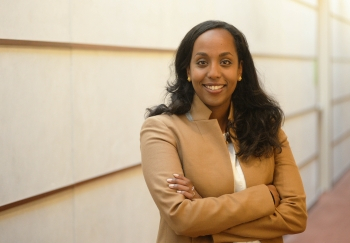
October 4, 2016, NEW YORK—Rahma A. Hussein, a lawyer specializing in international human rights and international criminal law, joined Columbia Law School’s Human Rights Institute this month. Hussein serves as the legal fellow on the Project on Counterterrorism, Armed Conflict, and Human Rights at the Institute.
Hussein brings particular expertise in working in the African regional human rights system, including on human rights in the context of counter-terrorism operations in Ethiopia, crackdowns on civil society organizations in Rwanda and the disruption of peaceful assemblies in Zimbabwe. Her human rights litigation experience is complemented by fact-finding experience, including through working with survivors of the genocide in Rwanda.
“I am delighted to be joining the Human Rights Institute at Columbia Law School, which is at the forefront of efforts to ensure respect for human rights in the context of counterterrorism and armed conflict,” said Hussein. “Bringing an end to violations in the context of counter-terrorism and armed conflict is of critical importance. Victims around the globe continue to be affected by U.S. counter-terrorism policy and practice, including in drone strikes and U.S. involvement in conflicts around the globe, and by the failure to ensure meaningful accountability for torture.”
“We are thrilled to have Rahma Hussein join the Institute at this crucial juncture,” said Alex Moorehead, Director of the Institute’s Project on Counterterrorism, Armed Conflict, and Human Rights. “Her regional expertise and experience in strategic human rights litigation in domestic U.S. cases and internationally will be invaluable in our efforts to secure the legal protection of rights-holders around the world.”
Prior to joining the Institute, Hussein was responsible for Robert F. Kennedy Human Rights’ litigation and advocacy case work on sub-Saharan Africa. This included engaging in all stages of the proceedings before the African Court and African Commission on Human and Peoples’ Rights in cases involving civic and political participation. She previously worked on international criminal law and transitional justice issues, Alien Tort Statute claims, and immigration cases. Prior to law school, Rahma served for over two years as Project Coordinator and Legal Investigator with the NGOs African Rights and Redress in Kigali, Rwanda, where she worked with survivors of the Rwandan genocide, collaborated with international and local prosecutors, and consulted with the UN peacekeeping mission in the Democratic Republic of Congo.
“Rahma’s expertise adds an important new dimension to the work of the Institute,” said Sarah Knuckey, the faculty co-director of the Human Rights Institute and director of the Human Rights Clinic. “Students working with the Human Rights Clinic at Columbia Law School will greatly benefit from her understanding of the African regional human rights system, collaborating with various international actors to achieve accountability, and practical field experience working in conflict and post-conflict zones.”
The Institute’s project on Counterterrorism, Armed Conflict, and Human Rights seeks to advance respect for human rights in conflict and law enforcement operations. It engages in independent research, legal analysis, and advocacy to promote legal compliance and accountability and to foster dialogue among governments, academics, and civil society advocates. The Institute hosts expert meetings and conducts research and advocacy on emerging and urgent issues, including: harmonizing standards in armed conflict; aid, assistance, and support activities in the context of counterterrorism and armed conflict; the use of force, including through drones strikes and so-called ‘targeted killings’; domestic counterterrorism practices; accountability for war crimes; and compensation for victims.
# # #
Founded in 1998 by the late Professor Louis Henkin as the anchor for human rights within Columbia Law School, the Human Rights Institute promotes engagement and knowledge of human rights within the law school, throughout the University, and around the world. Across the many substantive areas of its work, the Institute builds bridges between scholarship and activism, develops capacity within the legal community, engages governments, and models new strategies for progress.
Columbia Law School, founded in 1858, stands at the forefront of legal education and of the law in a global society. Columbia Law School combines traditional strengths in corporate law and financial regulation, international and comparative law, property, contracts, constitutional law, and administrative law with pioneering work in intellectual property, digital technology, tax law and policy, national security, human rights, sexuality and gender, and environmental law.
Join us on Facebook: Columbia Law School and Human Rights Institute
Follow us on Twitter: @columbialaw and @CLSHumanRights
